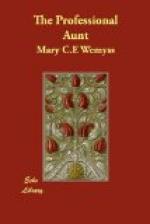To begin with, Aunt Anna proceeded to explain, she could never place herself in a position to which she was not born; she did not think it right. She said that Claud then urged her to look at it from stranger’s point of view, since that of man of the world was impracticable, which Aunt Anna said was a thing no mother could do, nor would she wish to do it. She left such things to actresses. Talking of actresses reminded her that Claud had even found fault with Maud as an actress, when every one knew how very excellent she was. Several newspapers, the Southshire Herald in particular, had alluded to her as one of our most talented actresses.
“We had a professional down to coach her, and he said there was really nothing he could teach her. He was a very nice man, and had all his meals with us. I went,” continued Aunt Anna, “to see the great French actress who was in London in the spring, you remember? And if ever a mother went with an unprejudiced mind, I was that mother. I was prepared to think she was better than Maud, and if she had been, I should have been the first to say it. But she was not, at least not to my mind! Maud is always a lady, even on the stage, and that woman was not.”
I ventured to suggest that she was perhaps not supposed to be a lady in the part. Aunt Anna said, “Perhaps not, but that does not matter; Maud would be a lady under any circumstances, whatever character she impersonated, laundress or lady. Claud says she will never act till she learns to forget herself I trust one of my daughters will never do that!”
I strove to pacify Aunt Anna, but her tender heart was wounded and she was hard to comfort.
“Claud must admire Edith’s violin playing,” I ventured.
Aunt Anna shook her head. “He begged me to eliminate from my mind all preconceived notions and to judge her from the unprejudiced point of view. I told Edith to put away her violin. Claud says I must call it a fiddle. I could not bear to see it. I never thought there could be such dissension in our united family.”




